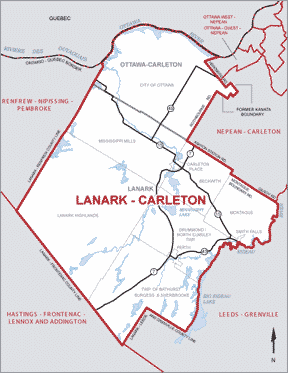In this model, Lanark-Carleton would remain a single-member riding.

In this model, Lanark-Carleton would remain a single-member riding. |
 |
|---|
| Lanark-Carleton - Actual results Ontario provincial election 2003 | |||||||
|---|---|---|---|---|---|---|---|
| Liberal | Progressive Conservative | NDP | Green | Family | Other | Total | |
| Votes received | 23,466 | 29,641 | 3,554 | 2,564 | 1,275 | 0 | 60,500 |
| Seats won | 0 | 1 | 0 | 0 | 0 | 0 | 1 |
| Seat % | 0% | 100% | 0% | 0% | 0% | 0% | 100% |
| Vote % | 38.79% | 48.99% | 5.87% | 4.24% | 2.11% | 0.00% | 100% |
| Distortion | -38.79 | +51.01 | -5.87 | -4.24 | -2.11 | 0 | 51.01 |
In the 2003 Ontario provincial election, the riding elected a Progressive Conservative MPP.
Under the existing voting system, 48.99% of the voters got the representative they voted for.
The other 51.01% of the votes were wasted.
In our model, we assume that the Progressive Conservative would still have won the riding.
Under this model, 48.99% of the voters in Lanark-Carleton would still have gotten the local representative they voted for.
However, the other 51.01% of the voters would know that their vote had helped to elect provincial list members, so they too would have representation.
All of the votes cast would have helped to elect an MPP, and therefore none would have been wasted.
| Simulated compensatory list seats - Ontario provincial election 2003 | |||||
|---|---|---|---|---|---|
| Liberal | Progressive Conservative | NDP | Green | Family | Total |
| 6 | 8 | 2 | 4 | 1 | 21 |
| Lanark-Carleton - Actual results Canadian federal election 2000 | |||||||
|---|---|---|---|---|---|---|---|
| Liberal | Canadian Alliance | Progressive Conservative | NDP | Green | Other | Total | |
| Votes received | 22,811 | 24,670 | 12,430 | 1,946 | 871 | 645 | 63,373 |
| Seats won | 0 | 1 | 0 | 0 | 0 | 0 | 1 |
| Seat % | 0% | 100% | 0% | 0% | 0% | 0% | 100% |
| Vote % | 35.99% | 38.93% | 19.61% | 3.07% | 1.37% | 1.02% | 100% |
| Distortion | -35.99 | +61.07 | -19.61 | -3.07 | -1.37 | -1.02 | 61.07 |
In the 2000 Canadian federal election, the riding elected a Canadian Alliance MP.
Under the existing voting system, 38.93% of the voters got the representative they voted for.
The other 61.07% of the votes were wasted.
In our model, we assume that the Canadian Alliance would still have won the riding.
Under this model, 38.93% of the voters in Lanark-Carleton would still have gotten the local representative they voted for.
However, another 60.05% of the voters would know that their vote had helped to elect provincial list members, so they too would have representation.
Only 1.02% of the votes cast would not have helped to elect an MP, and therefore would have been wasted.
| Simulated Ontario compensatory list seats - Canadian federal election 2000 | |||||
|---|---|---|---|---|---|
| Liberal | Canadian Alliance | Progressive Conservative | NDP | Green | Total |
| 0 | 9 | 6 | 5 | 1 | 21 |